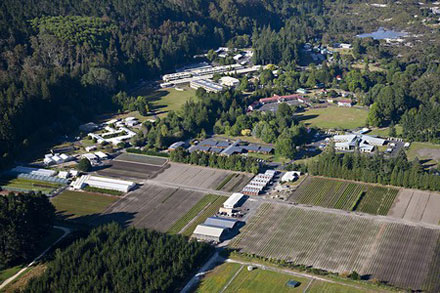The challenges facing communities affected by Cyclone Hale and Cyclone Gabrielle in recent weeks have rekindled important discussions about forestry practices and the impact that forestry slash and storm debris is having in regions hardest hit by adverse weather events.
Scion is working to support the forestry sector to better prepare for and manage the risks that come with operating planted forests under a changing climate and future uncertainty – these issues combine to challenge managers and forest owners to adapt their forest management practices.
Co-developed with industry, our Resilient Forests Research Program started in 2019 and is designed to ensure the long-term economic, environmental, and social sustainability of forestry by creating forests that are more resilient to the impacts of climate change, pests and disease and an industry which is resilient in the face of socio-economic shocks, for example global pandemics or regional unrest. This work builds on previous environmentally focused research program.
With industry, we are carrying out research trials to identify forest management practices that aim to future-proof the productivity of forests whilst recognising the need to apply bespoke systems in regions that are most likely to require highly site-specific solutions to meet the needs of both regional communities and the forest industry.
Three-and-a-half years into the program, research is highlighting where system changes could be applied. This includes optimisation to increase productivity of plantations where it is sustainable – an approach that will support the industry to diversify or move away from forestry in more climate-affected regions. Through surveys of industry stakeholders, we are also building a better understanding of the factors that motivate forest growers to adapt and make changes to forestry practices.
Changed land use and management systems that address the impact of erosion, slash and storm debris on communities are a long-term challenge; an all-of-systems approach must be considered as part of the solution. This could include retreating forestry from risky sites whilst supporting the forestry sector to remain productive and generate new high value from slash and woody debris – solutions that will also support regional growth through the development of new manufacturing sectors and exports. Scion’s research, innovation and technology has a lot to contribute to these new ways of thinking in the face of more frequent high intensity rain events.
Climate change is driving an increasingly urgent need for adaptation across forestry in regional New Zealand. Our research, which is aligned with our Strategy to 2030: Right tree, right place, right purpose, is helping to inform industry decision-makers and government agencies about options they have in an uncertain future.
Scion is a New Zealand Crown research institute that specialises in research, science and technology development for the forestry, wood product, wood-derived materials, and other biomaterial sectors.






